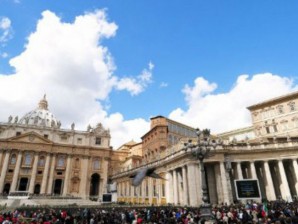
Vatican city AFP PHOTO
VATICAN CITY — The Vatican on Saturday condemned Italian media reports of intrigue, corruption and blackmail among senior prelates, saying these were meant to pressure cardinals ahead of their vote to elect Pope Benedict XVI’s successor.
Vatican spokesman Federico Lombardi dismissed as “gossip, disinformation and sometimes calumny” the reports, which are linked to an investigation by a committee of cardinals last year over a series of damaging leaks of confidential papal documents.
In a statement on Vatican radio’s website, Lombardi also referred to the upcoming conclave saying there was “unacceptable pressure to condition the vote of one or other member of the college of cardinals, who might be disliked for one reason or another”.
“There are people who are trying to take advantage of this moment of surprise and disorientation of weak souls to sow confusion and discredit the Church and its government,” Lombardi said.
“People who think in terms of money, sex and power and see different realities through this prism cannot see the Church any differently,” he said.
“The result is a profoundly unjust description of the Church and many of its people,” he added.
“We want this to be a time of sincere reflection as tradition and the laws of the Church indicate.”
The pope last year appointed three retired cardinals to conduct a wide-ranging investigation into the Roman Curia, in parallel with a police inquiry into a scandal known as “Vatileaks”.
The pope’s former butler Paolo Gabriele was arrested, convicted and later pardoned by the pope for leaking the documents, but suspicions linger in the Vatican that more people were implicated.
The cardinals submitted their secret report for the pope’s eyes only, but Italian media have reported they will also share their conclusions with the cardinals who will elect the next pope, ahead of the pontiff’s resignation next week.
The Panorama news weekly and the Repubblica daily said on Thursday that the cardinals’ report contained allegations of corruption and of blackmail attempts against gay Vatican clergymen, as well as favouritism based on gay relationships.
But in an interview with El Pais, one of the investigating cardinals, Julian Herranz, said the scandal was “a bubble” that had been “inflated”.
“There will be black sheep, I am not saying there are not, like in all families,” he said, adding that the investigators had “spoken to people, seen what works and what does not, lights and shadows”.
At his final public mass last week, Benedict himself condemned “religious hypocrisy” and urged an end to “individualism and rivalry”.
“The face of the Church… is at times disfigured. I am thinking in particular of the sins against the unity of the Church,” he said, without elaborating.
The run-up to conclaves to elect a new pope is often accompanied by rumours and gossip in Italian media, as rival factions battle for influence.
“Vatileaks” first exploded in January last year when Italian media published a series of letters to the pope in which Carlo Maria Vigano, then head of the Vatican City’s government, denounced corruption.
The following leaks pointed to divisions in the Vatican including efforts to unseat Secretary of State Tarcisio Bertone, a divisive figure.
On May 23, Gabriele was arrested and his house inside the Vatican walls was raided by Vatican gendarmes who found hundreds of sensitive documents.
A day later, the head of the Vatican bank, Ettore Gotti Tedeschi, was sacked, accused of mismanagement and indiscretions linked to the leaks.
Dino Boffo, the former editor of the Italian Catholic weekly Avvenire, who was hounded out by false gossip that he had molested another man, said it was time to put an end to Vatican intrigue.
“I think the Holy See should stop with the terrible vice of anonymous letters being sent with no signatures and no intended recipients,” he told the ANSA news agency, adding that Benedict had always urged “a clean sweep and an end to internal wars.”